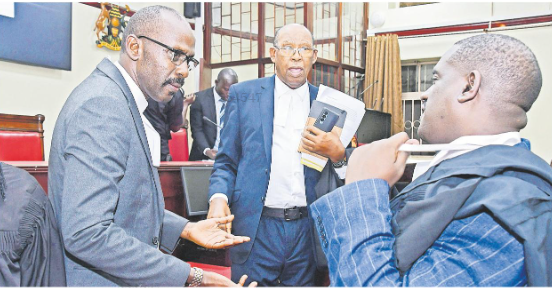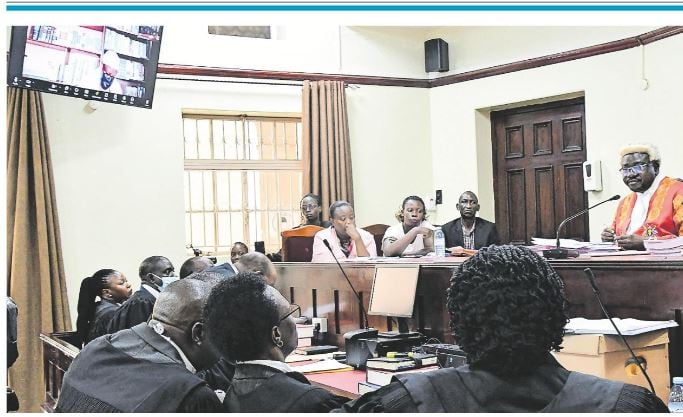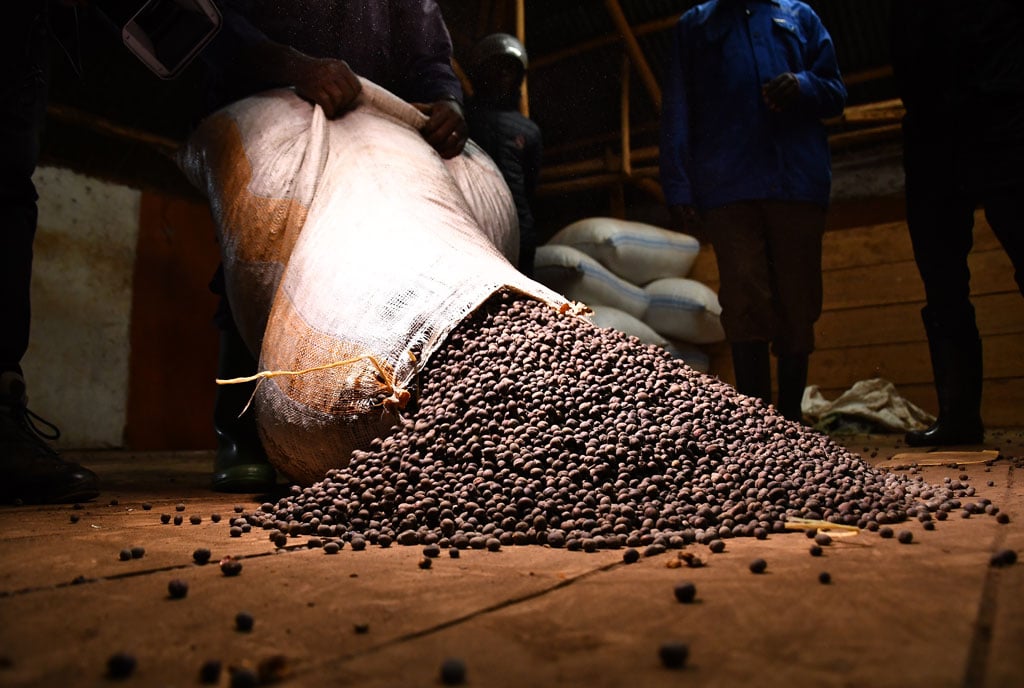
Left to right: Ms Molly Katanga’s lawyers, Mr Jet Tumwebaze, Mr Peter Kabtsi and Mr Elison Karunga at the High court in Kampala on November 4, 2024. PHOTO | ABUBAKER LUBOWA
At 10:14am presiding judge Isaac Muwata walks into a fully-packed courtroom
The court clerk calls for the Henry Katanga murder case file as the suspects who appear physically in court, head to the dock.
Assistant Director of Public prosecution (DPP) Samali Wakooli, introduces the prosecution and the defence lawyers present in the court.
Macdosman Kabega: My lord, PW10, in his testimony, told this court that his examination was based on exhibits received from the police.
Judge: In his what?
Kabega: In his evidence in examination of exhibits he received from the police, including extraction of information on all the exhibits that were submitted in pursuance of the two court orders and his examination was, therefore, based on the exhibits received as a result of court orders.
My lord, the court orders, the first one was received as a miscellaneous application 7875/2023. My lord, the second order dated November 22, [2023,] miscellaneous application number 8164/2023. My lord, these orders were issued by His worship, Charles Opio, Grade Two, Makindye Court.
My lord, the first illegality regarding these orders is the letter dated November 2, 2023, under reference CID 13/1016/137/2023 and it’s purporting forward a court order to the director of forensics services at the police headquarters, Kampala and in the third paragraph, this is what it says, “the purpose of this letter is to request you to appoint a cyber-crime officer to inspect, extract, analyse and prepare the report in relation to CCTV footages at the premises of the late Katanga Henry, Plot 50, Chwa Road, Mbuya, to facilitate our investigation”.
My lord this may be for the purpose of emphasis, he says the copy of the court order is here attached. The court orders attached to the report are dated November 10 and 22, 2023, and received at the forensic lab services. So where is this court order of November 2, unless it was not supplied to us? That is all.
My lord, secondly, the two affidavits sworn by Detective Sergeant David and are commissioned by His Worship Charles Opio, Grade Two Makindye Court and it’s this same magistrate, my lord, after commissioning the affidavit that proceeded to hear and grant the application.
My lord, we want to submit that what His worship Charles Opio did was illegal, null and void. Why do I say so? Every magistrate shall have the powers of the commissioner of oath and my lord, my submission is that once commissioned, that magistrate cannot, therefore, sit and adjudicate a matter where that affidavit has been commissioned in the matter.
The question to be answered here is whether the commissioner for oath can exercise the powers given under the oaths statute in matters in which he/she is an advocate to any of the clients in the proceedings.
The import of our submission is that Mr Opio was concerned [about] the matter that had been placed before him for commission of an affidavit. So, therefore, the orders of 10th and 22nd November, what he did my lord, cannot be cured under Article 126 (c) of the Constitution.
Thirdly, the orders which were purportedly issued, one of them said order to extract information from mobile phones in accordance with the procedures required of digital evidence of Computer Misuse Act.
My lord, that is wrong and unlawful. First, my lord, look at the preamble of the Computer Misuse Act. The Act was enacted to ensure [the] safety and security of electronic transactions and information systems.
My lord, this is what that section says. Where a magistrate is satisfied that the information given by a police officer, and that there are reasonable grounds for; a, that an offence under this Act….., that is the Computer Misuse Act and that is where my emphasis is, has been or is about to be committed, my lord, the accused cannot be charged.
Worse still my lord, this magistrate who made the two orders, did not have the jurisdiction to do so. My lord, the jurisdiction for that Act is either Chief Magistrate or Grade One Magistrate.
In light of that my lord, our humble prayer is that, once an illegality has been brought to the light of the court, it should not condone it as it overrides everything, including any admissions. So my humble prayer is that the evidence pertaining to the court orders based on exhibits that were illegally obtained, my lord, cannot stand. They can only be expunged, I so pray, my lord.
Jonathan Muwaganya: For the record, Jonathan Muwaganya, Mr Kabega didn’t give us the extent of his objections but nonetheless, we shall proceed. My lord with the objection raised by Mr Elison Karuhanga yesterday, he was basically objecting to the continuation of PW10 to testify on the details of his expert forensic report. Mr Karuhanga premised his objection under the Computer Misuse Act, the Police Act, the Evidence Act, and the Constitution.
My lord, our response is as follows, regarding the disclosure of the raw data from which the expert report was made, my lord, our position has been and still is that raw data is not the prosecution evidence that we intend to rely on.
My lord, it's inconceivable that the prosecution will lift all the electronic content on the accused’s phones from which the analysis was made and disclose it.
First, my lord, it’s not everything that was accessed and examined that forms the evidence on the respective. Certainly, only specific information as highlighted in the report was found relevant. My lord, whatever was found relevant, was specifically lifted and transplanted in the report which was disclosed and even in possession of the defence.
My lord, I believe there is no contest that the forensic report to which they don’t want the expert to transverse its content contains information as to what was found in the electronic devices.
It's our submission, my lord, that by disclosing the report and its content, reasonable information necessary for any accused person to know, the nature and extent of evidence we intend to adduce against him or her, was available.
My lord, secondly, access and use of electronic evidence, can only be lawful either through the consent of the owner of the device or by way of a court order. If it’s by a court order as in our case, then the extent of dealing with such evidence is confined within the commands of that specific court order.
My lord in our case, the court order is clear, it was an order to inspect, extract, analyse, and prepare a report in relation to the exhibits. Indeed, my lord, whatever was so extracted and analysed is contained in the report.
In our humble opinion, my lord, which was disclosed, defence counsel would be poking too far into the privacy of their own clients to require to know or access the contents of their electronic devices beyond what was placed in the report and disclosed to them. My lord, soft copies of raw data contained in the devices are not only private but can also be susceptible to abuse if misused.
But my lord as prosecution, we have realised that this has been a persistent matter and we believe with your indulgence, the persistent matter that the lawyers are interested in knowing the raw data in their clients' gadgets.
My lord with your indulgence, we think it should be put to rest by requiring that each of the accused persons expressly consent to releasing of their raw data because we have consulted the expert and he can uplift it in soft copy provided to whoever the owners of this gadget authorise. My lord in that case as prosecution we shall be safeguarded against potential complaints of infringement of their personal privacy.
I do not mind if this is done if they expressly so authorise. We shall be happy. My lord we emphasize that express consent because releasing of this raw data was not covered by the authority of the court order under which we proceeded but if they expressly authorize, we shall be happy my lord to provide that entire raw data beyond what we have already provided in the report.
My Lord, we do not need to overemphasize the fact that electronic evidence is very volatile and prone to manipulation, and in a criminal trial, management of exhibits is very volatile and prone to manipulation.
My Lord, it is for that reason that raw data and physical gadgets could not be shared for purposes of maintaining the chain of custody. But they are evidence in their physical form as they sound.
So the submissions of the defence that they should have access to the gadgets as MrKaruhanga submitted, my Lord, that will potentially be breaking the chain of custody and will compromise the integrity of the evidence before submission in court. That is why, my lord, disclosure of the gadgets or raw data reports, by way of reports, or explicit slips as opposed to physical access or handing over.
My Lord, if we handed over these gadgets, it would be like in a case of robbery where pangas or guns are used and then before we present them in court we avail them to the accused persons or their lawyers.
That would be very complicated but in this case, you have the phones, you have the DVRS that you hand them over to that I don't technically not even us ordinarily would access them because they are preserved by the last action officer only for presentation in court .
My lord we want to submit that weapons and instruments of commission of offence cannot be handed over to the accused persons before they are presented in court. But even when presented in the court, the court still reserves the discretion at the end of the trial to determine the case.
My lord, you earlier guided us, which guidance, my Lord, we have duly considered that if some of the contents of the exhibits, if need arises in the course of the trial, and after completing the chain of custody by presentation in court, the court shall avail the defence sufficient time to study them and prepare for cross-examination.
My lord, we find this court's guidance the most appropriate in terms of the management of the chain of evidence.
Mr Karuhanga, in regards to the application of the Computer Misuse Act, my lord, on this point, we want to entirely agree with what Mr Kabega has submitted on this matter.
My lord, we are happy that on this one, we have a point of convergence, a point of argument. My Lord, the Computer Misuse Act was cited by our learned brother, Elison out of context.
It is not the procedural law that regulates recovery and the handling of exhibits generally including those in electronic form in the process of criminal investigations of offences under the Penal Code Act such as murder and other charges under trial.






